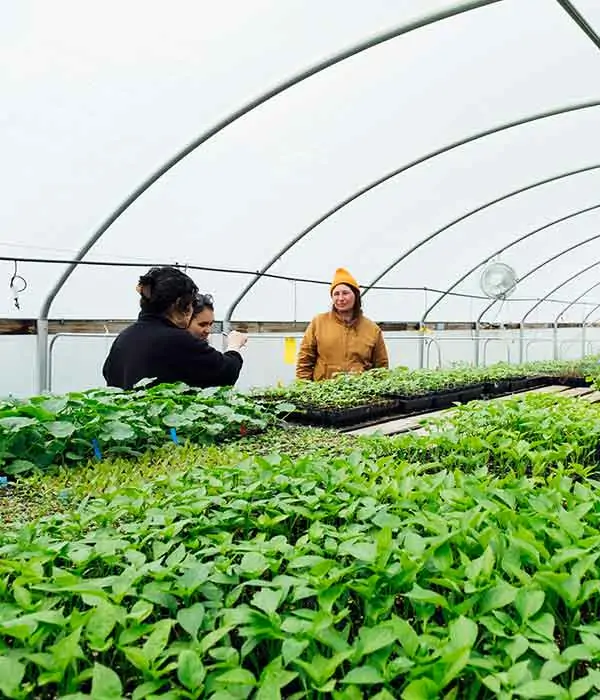Project partners:
June 2023 – June 2026
Aerial view of friends gathered to harvest radishes at black futures farm in Portland, OR. Photo credit: Robert Cuadra
In partnership with Ecotrust, the United States Department of Agriculture (USDA) is launching a new urban agriculture center for the Portland region to support urban agriculture efforts of historically underserved farmers.
Producers need targeted, focused, and intentional outreach, education, and support, including community-led, community-centered, and culturally appropriate solutions that will support their involvement and engagement in Farm Service Agency (FSA) and other USDA programs and services, as well as meet their unique needs for growth. As we work collaboratively over the next three years, Ecotrust commits itself to build the capacity of the Oregon’s FSA to serve producers inclusively by conducting outreach, distributing $150,000 in microgrants, providing direct technical assistance and facilitating on-farm engagements while building awareness of USDA programs.These efforts are intended to result in a greater number of underserved producers utilizing federal programs that support conservation practices, land access, and operations expansion.
This work is grounded in strong partnerships between Black Food Sovereignty Coalition, Oregon Department of Agriculture, Oregon State University Center for Small Farms, Oregon Metro, and Multnomah County Health Department’s Racial and Ethnic Approaches to Community Health program that works to ensure the agency delivers equitable service to all.
Apply for a 2024 Microgrant
We are currently accepting applications for microgrants through the link below. Applications must be submitted by 11:59:00 PM PT on August 13, 2024.
Timeline
July 16, 2024 | Applications open
July 30, 2024 at 3pm PT | Virtual info session via Zoom
August 13, 2024 | Applications close
October 2024 | Funds disbursed to applicant
January 31, 2025 | Funds must be spent
February 28, 2025 | Grant reporting due
Learn more from our informational flier and list of resources.
Have questions about the application process? Please email fsamicrogrants@ecotrust.org
Resources

FLIER
Black Food Sovereignty Coalition and Ecotrust are distributing microgrants from a total budget of $150,000 through a cooperative agreement with the USDA Farm Service Agency.
Applicants can apply for a one-time grant of $5,000.
If awarded, funds must be spent by January 31, 2025.

REQUEST FOR APPLICATION

Convocatoria de solicitudes (RFA)
Ubicación: Portland, OR
Montos de financiamiento: El programa de microsubvenciones cuenta con un presupuesto total de $150,000 durante la duración del acuerdo de cooperación. Los solicitantes pueden pedir una subvención única de $5,000. Si se conceden,
los fondos deberán gastarse antes del 1 de diciembre de 2025.

Blank Application

Blank Application
Objeto de la microsubvención:
• Aumentar la capacidad de los agricultores urbanos BIPOC (negros, indígenas y personas de color) y otros productores para cultivar alimentos, medicinas, fibras o productos básicos o para ampliar sus operaciones de cultivo;
• Aumentar la capacidad de los agricultores urbanos BIPOC y de otros productores para aplicar prácticas respetuosas con el clima y/o de conservación que mejoren la calidad del suelo y aumenten su resiliencia ante un clima cambiante, si actualmente no se dispone de financiamiento a través de los programas existentes del USDA.

Sample Application

misc
In accordance with Federal law and U.S. Department of Agriculture (USDA) civil rights regulations and policies, this institution is prohibited from discriminating on the basis of race, color, national origin, sex, age, disability, and reprisal or retaliation for prior civil rights activity. (Not all prohibited bases apply to all programs.) …

Website
Farm Service Agency engages in the following types of cooperative agreements: …

Blog post
A $1.5M cooperative agreement will support utilization of USDA programs among farmers historically underserved or discriminated against by the agency. Ecotrust is among the organizations who will be leading this work in the Portland Metro region.

Press release
August 7, 2023 | A $1.5M cooperative agreement will support utilization of USDA programs among farmers historically underserved or discriminated against by the agency

News
July 25, 2023 | Portland will be home to one of 17 new urban agriculture centers nationwide with a $1.5 million investment from the U.S. Department of Agriculture.

News
July 24, 2023 | Reps. Suzanne Bonamici (OR-1), Earl Blumenauer (OR-3), Andrea Salinas (OR-6), and Sens. Ron Wyden (OR) and Jeff Merkley (OR) applaud the Biden-Harris administration’s nearly $1.5 million investment in a new Urban Service Center to help urban farmers and strengthen local food systems in the Pacific Northwest.

Community partners talk about growth cycles with farmer Michelle Week, founder of Good Rain Farm, at the Headwaters Incubator Program in Gresham, OR. Photo credit: Kari Rowe

Sabrina Cerquera, Program Manager of Food Systems Equity, and Aaron Vargas, former Ecotrust staff. Photo credit: Kari Rowe
Partners
is a collaboration hub for Black and Brown communities that exists to ignite BIPOC communities to participate as owners and movement leaders within food systems, placemaking, and economic development.
equitably serves all farmers, ranchers, and agricultural partners through the delivery of effective, efficient agricultural programs for all Americans.
serves the changing needs of Oregon’s diverse agricultural and food sectors to maintain and enhance a healthy natural resource base and strong economy in rural and urban communities across the state.
advances sustainable agriculture, resilient community food systems, and the long-term viability of Oregon’s small and mid-scale farmers and ranchers.
is the nation’s first directly elected regional government and serves more than 1.7 million people in Clackamas, Multnomah, and Washington counties whose boundary encompasses Portland and 23 other cities region wide.
works to develop and implement local, culturally appropriate programs to address a wide range of health disparities among the Black/African immigrant and refugee communities throughout Oregon.
Ecotrust Project Team & Services
Want to learn more? Check out the full Ecotrust Staff & Board and all of our Tools for Building Collective Change.










We cultivate leaders and assist with funding sources.

We build and deliver mission-aligned projects in partnership.

We contribute tools, analyses, and frameworks that move projects forward.